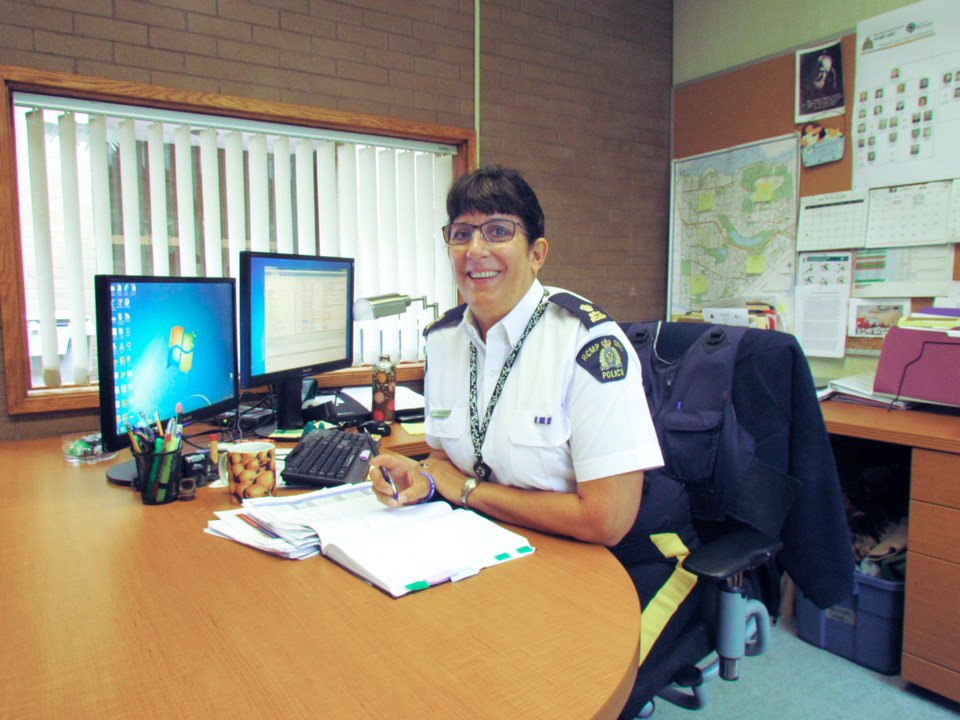It hasn’t been an easy road for Burnaby RCMP’s new community programs officer – when she first applied to the RCMP she was told she wasn’t the right person for policing, but she persevered and is now one of the Burnaby detachment’s top ranking officers.
Insp. Kathy Hartwig is one of the newest members of the Burnaby RCMP. Originally from Vernon, she first applied to the Red Serge in 1985 but wasn’t accepted.
The interviewer listed a number of qualities that made her a poor candidate for the RCMP – she had kids, she was married, she hadn’t finished post-secondary school, her parents were divorced, and so on.
“He asked me a lot of questions, being a female, that you would never ask. Like one of them, which strikes me to this minute, is he asked me if I’d ever had an abortion,” she said.
Hartwig was hardly the first woman to apply to the RCMP, but looking back, she understands how much of a boys club it was.
But the rejection didn’t break Hartwig. She wrote to the RCMP, asking them to reconsider their decision, they said, “No.” But she was determined to become a Mountie, so she set out to improve her application – and prove everyone wrong.
“Like many things in my career, sometimes the things that hurt the most ended up being better in the end because it motivated me,” she said.
Hartwig was told she could reapply to the RCMP in two years if she really wanted to. She knew she had some work to do before she would be ready, so she joined the Vernon RCMP auxiliary program, she enrolled in courses at Okanagan College and some distance courses at Simon Fraser University, and worked on her fitness. (The RCMP implemented a physical abilities test between her first and second applications.)
Two years passed by quickly, and soon Hartwig got her second interview, with the same RCMP officer, much to her dismay, but this time she was ready. And sure enough, she was accepted into the ranks of the RCMP.
The mother-of-two joined the force in September 1988 and was immediately sent to Montreal for official languages training. She arrived at Depot in Regina, Sask. six weeks later to begin her training.
“Depot was hard, having kids and leaving them behind, it just about killed me. There wasn’t a day that I didn’t stand in the mirror in the bathroom … looking at myself (asking), ‘Why are you here? Why did you do this?’” she recalled. “I missed my babies.”
Despite the struggle, Hartwig dedicated herself to her training. Troop 13 had only 21 women at the outset, and only 17 graduated in the end.
After graduation, in 1989, Hartwig packed up her family and headed to St. Albert, Alta. for her first RCMP posting. She was in Alberta for five years, and she absolutely loved it. Had she had the choice, she would have never left, she said.
Hartwig was sent to Sooke on Vancouver Island after her Alberta posting. She spent about two-and-a-half years there, leaving in 1996 – it was the last detachment Hartwig worked at before getting the job with the Burnaby RCMP.
Between 1996 and 2015, Hartwig worked with various federal and provincial RCMP units. She was promoted to corporal and assigned to the federal drug enforcement unit. After that, she was sent back to the mainland to work in the anti-corruption unit for the Lower Mainland District.
“I promoted out of there to go to sergeant-in-charge of the human source unit,” she said. “I loved that work; loved the whole area, the controversial part of human sources, and the law and the legal complications.”
She was in the human source unit for about a-year-and-a-half, and then she left to work in a new unit the RCMP had created six months earlier – the office of investigative standards and practices.
Staff in the office were all high-ranking officers, and they were responsible for making sure the quality of major case investigations was top-notch.
“That was where my major case career sort of took flight,” Hartwig said.
She spent about five years there. From there she moved to the major case management service centre, which is a team of officers and civilian members who provide support to major case investigators.
Despite such a long career with the RCMP, Hartwig has managed to do something new each time she’s been transferred, and her posting in Burnaby isn’t any different.
As the community programs officer, she oversees a huge chunk of the units at the Burnaby RCMP, including the school liaison officers, the Prolific Offender Suppression Team (POST), victim services, auxiliary constables, community policing with the City of Burnaby, restorative justice and youth counselling, and comparative statistics (COMSTAT).
“I get everything that doesn’t fit anywhere else,” she said. “It’s a massive portfolio.”
As Hartwig enters the latter part of her career – a career that has been very productive, she added – she hopes she can help new constables become the best police officers they can be.
“My goal is to make sure that the people that work here … are strong investigatively,” she said.



